Women who changed the world
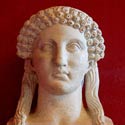 Sappho (c
570 BC) One of the first published female writers. Much of her poetry
has been lost but her immense reputation has remained. Plato referred to
Sappho as one of the great 10 poets.
Sappho (c
570 BC) One of the first published female writers. Much of her poetry
has been lost but her immense reputation has remained. Plato referred to
Sappho as one of the great 10 poets.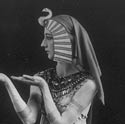 Cleopatra (69
-30 BC) The last Ptolemaic ruler of Egypt. Cleopatra sought to defend
Egypt from the expanding Roman Empire. In doing so she formed
relationships with two of Rome’s most powerful leaders Marc Anthony and
Julius Caesar.
Cleopatra (69
-30 BC) The last Ptolemaic ruler of Egypt. Cleopatra sought to defend
Egypt from the expanding Roman Empire. In doing so she formed
relationships with two of Rome’s most powerful leaders Marc Anthony and
Julius Caesar.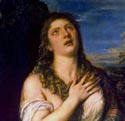 Mary Magdalene (4
BC – 40AD) Accounts from the Gospels and other sources suggest Mary
Magdalene was one of Jesus’ most devoted followers. Mary Magdalene stood
near Jesus at his crucifixion and was the first to see his
resurrection.
Mary Magdalene (4
BC – 40AD) Accounts from the Gospels and other sources suggest Mary
Magdalene was one of Jesus’ most devoted followers. Mary Magdalene stood
near Jesus at his crucifixion and was the first to see his
resurrection.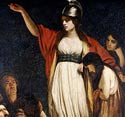 Boudicca (1st
Century AD) Boudicca was an inspirational leader of the Britons. She
led several tribes in revolt against the Roman occupation. Initially
successful her army of 100,000 sacked Colchester and then London. Her
army was later defeated.
Boudicca (1st
Century AD) Boudicca was an inspirational leader of the Britons. She
led several tribes in revolt against the Roman occupation. Initially
successful her army of 100,000 sacked Colchester and then London. Her
army was later defeated.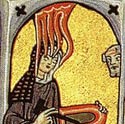 Hildegard of Bingen (1098-1179)
Mystic, author and composer. Hildegard of Bingen lived a withdrawn
life, spending most of her time behind convent walls. However her
writings, poetry and music were revelatory for the time period. She was
consulted by Popes, Kings and influential people of the time. Her
writings and music have influenced people to this day.
Hildegard of Bingen (1098-1179)
Mystic, author and composer. Hildegard of Bingen lived a withdrawn
life, spending most of her time behind convent walls. However her
writings, poetry and music were revelatory for the time period. She was
consulted by Popes, Kings and influential people of the time. Her
writings and music have influenced people to this day.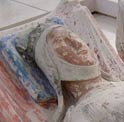 Eleanor of Aquitaine (1122-1204) – The
first Queen of France. Two of her sons Richard and John went on to
become Kings of England. Educated, beautiful and highly articulate,
Eleanor influenced the politics of western Europe through her alliances
and influence over her sons.
Eleanor of Aquitaine (1122-1204) – The
first Queen of France. Two of her sons Richard and John went on to
become Kings of England. Educated, beautiful and highly articulate,
Eleanor influenced the politics of western Europe through her alliances
and influence over her sons.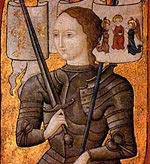 Joan of Arc (1412-1431) - The
patron saint of France, Joan of Arc inspired a French revolt against
the occupation of the English. An unlikely heroine; at the age of just
17, the diminutive Joan successfully led the French to victory at
Orleans. Her later trial and martyrdom only heightened her mystique.
Joan of Arc (1412-1431) - The
patron saint of France, Joan of Arc inspired a French revolt against
the occupation of the English. An unlikely heroine; at the age of just
17, the diminutive Joan successfully led the French to victory at
Orleans. Her later trial and martyrdom only heightened her mystique.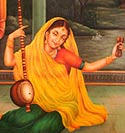 Mirabai (1498-1565) -Born
to a privileged Hindu family Mirabai broke with the conventions of
society to live the life of a mystic and devotee of Krishna. For her
unconventional lifestyle her family tried to kill her, but on each
occasion were unsuccessful. Her bhajans and songs helped revitalise
devotional Hinduism in India.
Mirabai (1498-1565) -Born
to a privileged Hindu family Mirabai broke with the conventions of
society to live the life of a mystic and devotee of Krishna. For her
unconventional lifestyle her family tried to kill her, but on each
occasion were unsuccessful. Her bhajans and songs helped revitalise
devotional Hinduism in India. St Teresa of Avila (1515-1582) – Mystic
and poet. St Teresa of Avila lived through the Spanish inquisition but
avoided been placed on trial despite her mystical revelations. She
helped to reform the tradition of Catholicism and steer the religion
away from fanaticism.
St Teresa of Avila (1515-1582) – Mystic
and poet. St Teresa of Avila lived through the Spanish inquisition but
avoided been placed on trial despite her mystical revelations. She
helped to reform the tradition of Catholicism and steer the religion
away from fanaticism.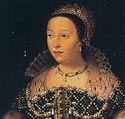 Catherine de Medici (1519-1589) – Born
in Florence, Italy Catherine was married to the King of France at the
age of 14. She was involved in interminable political machinations
seeking always to increase the power of her favoured sons. This led to
the disastrous St Bartholomew’s Day Massacre.
Catherine de Medici (1519-1589) – Born
in Florence, Italy Catherine was married to the King of France at the
age of 14. She was involved in interminable political machinations
seeking always to increase the power of her favoured sons. This led to
the disastrous St Bartholomew’s Day Massacre.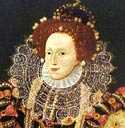 Elizabeth I (1533-1603) – Queen
of England during a time of great economic and social change, she saw
England cemented as a Protestant country. During her reign she witnessed
the defeat of the Spanish Armada leaving Britain to later become one of
the world’s dominant superpowers.
Elizabeth I (1533-1603) – Queen
of England during a time of great economic and social change, she saw
England cemented as a Protestant country. During her reign she witnessed
the defeat of the Spanish Armada leaving Britain to later become one of
the world’s dominant superpowers.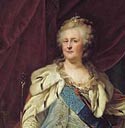 Catherine the Great (1729-1796) – One
of the greatest political leaders of the Eighteenth Century. Catherine
the great was said to have played an important role in improving the lot
of the Russian serfs. She placed great emphasis on the arts and helped
to cement Russia as one of the dominant countries in Europe.
Catherine the Great (1729-1796) – One
of the greatest political leaders of the Eighteenth Century. Catherine
the great was said to have played an important role in improving the lot
of the Russian serfs. She placed great emphasis on the arts and helped
to cement Russia as one of the dominant countries in Europe.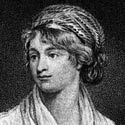 Mary Wollstonecraft(1759-1797) – Mary Wollstonecraft wrote the most significant book in the early feminist movement. Her tract “A Vindication of the Rights of Women”
laid down a clear moral and practical basis for extending human and
political rights to women. – A true pioneer in the struggle for female
suffrage.
Mary Wollstonecraft(1759-1797) – Mary Wollstonecraft wrote the most significant book in the early feminist movement. Her tract “A Vindication of the Rights of Women”
laid down a clear moral and practical basis for extending human and
political rights to women. – A true pioneer in the struggle for female
suffrage.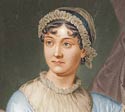 Jane Austen (1775-1817) -One
of the most popular female authors Jane Austen wrote several novels,
which remain highly popular today. These include “Pride and Prejudice”
“Emma” and “Northanger Abbey”. Jane Austen wrote at a time when female
writers were not so high profile, helping pave the way for future
writers.
Jane Austen (1775-1817) -One
of the most popular female authors Jane Austen wrote several novels,
which remain highly popular today. These include “Pride and Prejudice”
“Emma” and “Northanger Abbey”. Jane Austen wrote at a time when female
writers were not so high profile, helping pave the way for future
writers.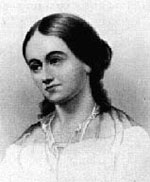 Margaret Fuller (1810-1850) was an American women’s rights advocate. Her book Women in the Nineteenth Century
(1845) was influential in changing perceptions about men and women, and
was one of the most important early feminist works. She argued for
equality and women being more self-dependent and less dependent on men.
Margaret Fuller (1810-1850) was an American women’s rights advocate. Her book Women in the Nineteenth Century
(1845) was influential in changing perceptions about men and women, and
was one of the most important early feminist works. She argued for
equality and women being more self-dependent and less dependent on men.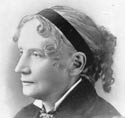 Harriet Beecher Stowe (1811-1896) -Harriet
Beecher Stowe was a life long anti slavery campaigner. Her novel “Uncle
Tom’s Cabin” was a best seller and helped to popularise the anti
slavery campaign. Abraham Lincoln would later remark her books were a
major factor behind the American civil war.
Harriet Beecher Stowe (1811-1896) -Harriet
Beecher Stowe was a life long anti slavery campaigner. Her novel “Uncle
Tom’s Cabin” was a best seller and helped to popularise the anti
slavery campaign. Abraham Lincoln would later remark her books were a
major factor behind the American civil war. Elizabeth Cady Stanton
(1815-1902) Elizabeth Stanton was a social activist and leading figure
in the early women’s rights movement. She was a key figure in helping
create the early women’s suffrage movements in the US. She was the
principle author of ‘Declaration of Sentiments’ in 1848.
Elizabeth Cady Stanton
(1815-1902) Elizabeth Stanton was a social activist and leading figure
in the early women’s rights movement. She was a key figure in helping
create the early women’s suffrage movements in the US. She was the
principle author of ‘Declaration of Sentiments’ in 1848.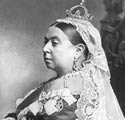 Queen Victoria (1819-1901) -Presiding
over one of the largest empires ever seen, Queen Victoria was the head
of state from 1837-1901.Queen Victoria sought to gain an influence in
British politics whilst remaining aloof from party politics. She came to
symbolise a whole era of Victorian values.
Queen Victoria (1819-1901) -Presiding
over one of the largest empires ever seen, Queen Victoria was the head
of state from 1837-1901.Queen Victoria sought to gain an influence in
British politics whilst remaining aloof from party politics. She came to
symbolise a whole era of Victorian values.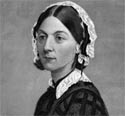 Florence Nightingale
(1820-1910) – By serving in the Crimean war, Florence Nightingale was
instrumental in changing the role and perception of the nursing
profession. Her dedicated service won widespread admiration and led to a
significant improvement in the treatment of wounded soldiers.
Florence Nightingale
(1820-1910) – By serving in the Crimean war, Florence Nightingale was
instrumental in changing the role and perception of the nursing
profession. Her dedicated service won widespread admiration and led to a
significant improvement in the treatment of wounded soldiers.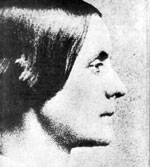 Susan B. Anthony (1820-1906) -Susan
Anthony campaigned against slavery and for the promotion of women’s and
workers rights. She began campaigning within the temperance movement
and this convinced her of the necessity for women to have the vote. She
toured the US giving countless speeches on the subjects of human rights.
Susan B. Anthony (1820-1906) -Susan
Anthony campaigned against slavery and for the promotion of women’s and
workers rights. She began campaigning within the temperance movement
and this convinced her of the necessity for women to have the vote. She
toured the US giving countless speeches on the subjects of human rights.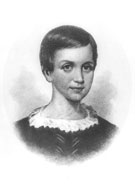 Emily Dickinson (1830 – 1886) – One
of America’s greatest poets Emily Dickinson lived most of her life in
seclusion. Her poems were published posthumously and received widespread
literary praise for their bold and unconventional style. Her poetic
style left a significant legacy on 20th Century poetry.
Emily Dickinson (1830 – 1886) – One
of America’s greatest poets Emily Dickinson lived most of her life in
seclusion. Her poems were published posthumously and received widespread
literary praise for their bold and unconventional style. Her poetic
style left a significant legacy on 20th Century poetry.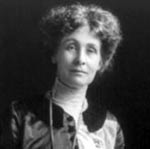
Emmeline Pankhurst (1858-1928) – A British suffragette, Emily Pankhurst dedicated her life to the promotion of women’s rights. She explored all avenues of protest including violence, public demonstrations and hunger strikes. She died in 1928, 3 weeks before a law giving all women over 21 the right to vote.
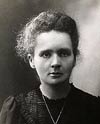 Marie Curie (1867-1934) – Marie
Curie was the first women to receive the Nobel Prize and the first
person to win it for 2 separate categories. Her first award was for
research into radioactivity (Physics 1903). Her second Nobel prize was
for Chemistry in 1911. A few years later she also helped develop the
first X ray machines.
Marie Curie (1867-1934) – Marie
Curie was the first women to receive the Nobel Prize and the first
person to win it for 2 separate categories. Her first award was for
research into radioactivity (Physics 1903). Her second Nobel prize was
for Chemistry in 1911. A few years later she also helped develop the
first X ray machines.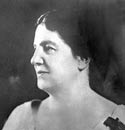 Emily Murphy (1868-1933) – Emily
Murphy was the first women magistrate in the British Empire. In 1927
she joined forces with four other Canadian women who sought to challenge
an old Canadian law that said, “women should not be counted as persons”
Emily Murphy (1868-1933) – Emily
Murphy was the first women magistrate in the British Empire. In 1927
she joined forces with four other Canadian women who sought to challenge
an old Canadian law that said, “women should not be counted as persons”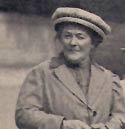
Rosa Luxemburg (1870-1919) – A leading Marxist revolutionary, Rosa Luxemburg sought to bring Social revolution to Germany. She wrote fiercely against German imperialism and for international socialism. In 1919, she was murdered after a failed attempt to bring about a Communist revolution in Germany.
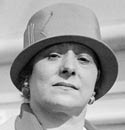
Helena Rubinstein (1870-1965) – Helena Rubinstein formed one of the world’s first cosmetic companies. Her business enterprise proved immensely successful and later in life she used her enormous wealth to support charitable enterprises in the field of education, art and health.
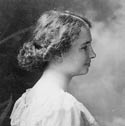 Helen Keller (1880-1968) – At
the age of 19 months Helen became deaf and blind. Overcoming the
frustration of losing both sight and hearing she campaigned tirelessly
on behalf of deaf and blind people.
Helen Keller (1880-1968) – At
the age of 19 months Helen became deaf and blind. Overcoming the
frustration of losing both sight and hearing she campaigned tirelessly
on behalf of deaf and blind people.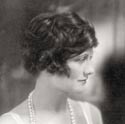 Coco Chanel (1883-1971)
– One of the most innovative fashion designers, Coco Chanel was
instrumental in defining feminine style and dress during the 20th
Century. Her ideas were revolutionary; in particular she often took
traditionally male clothes and redesigned them for the benefit of women.
Coco Chanel (1883-1971)
– One of the most innovative fashion designers, Coco Chanel was
instrumental in defining feminine style and dress during the 20th
Century. Her ideas were revolutionary; in particular she often took
traditionally male clothes and redesigned them for the benefit of women.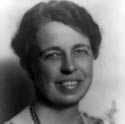 Eleanor Roosevelt (1884-1962)
– Wife and political aide of American president F.D.Roosevelt. In her
own right Eleanor made a significant contribution to the field of human
rights, a topic she campaigned upon throughout her life. As head of UN
human rights commission she helped to draft the 1948 UN declaration of
human rights.
Eleanor Roosevelt (1884-1962)
– Wife and political aide of American president F.D.Roosevelt. In her
own right Eleanor made a significant contribution to the field of human
rights, a topic she campaigned upon throughout her life. As head of UN
human rights commission she helped to draft the 1948 UN declaration of
human rights.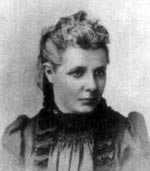 Annie Besant (1847-1933)
-Annie Besant was a campaigner for social justice, advocate of women’s
rights and later member of the Theosophist society. She also actively
campaigned for Indian independence.
Annie Besant (1847-1933)
-Annie Besant was a campaigner for social justice, advocate of women’s
rights and later member of the Theosophist society. She also actively
campaigned for Indian independence.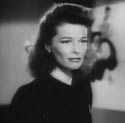 Katharine Hepburn (1907-2003) – An
iconic figure of twentieth Century film Katharine Hepburn won 4 Oscars
and received over 12 Oscar nominations. Her lifestyle was unconventional
for the time and through her acting and life she helped redefine
traditional views of women’s role in society.
Katharine Hepburn (1907-2003) – An
iconic figure of twentieth Century film Katharine Hepburn won 4 Oscars
and received over 12 Oscar nominations. Her lifestyle was unconventional
for the time and through her acting and life she helped redefine
traditional views of women’s role in society.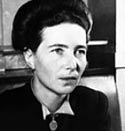 Simone de Beauvoir (1908-1986) – One
of the leading existentialist philosophers of the Twentieth Century,
Simone de Beauvoir developed a close personal and intellectual
relationship with Jean Paul Satre. Her book “The Second Sex” depicted
the traditions of sexism that dominated society and history. It was a
defining book for the feminist movement.
Simone de Beauvoir (1908-1986) – One
of the leading existentialist philosophers of the Twentieth Century,
Simone de Beauvoir developed a close personal and intellectual
relationship with Jean Paul Satre. Her book “The Second Sex” depicted
the traditions of sexism that dominated society and history. It was a
defining book for the feminist movement.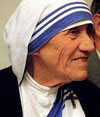 Mother Teresa (1910-1997) – Devoting
her life to the service of the poor and dispossessed Mother Teresa
became a global icon for selfless service to others. Through her
Missionary of Charities organisation she personally cared for 1000s of
sick and dying people in Calcutta. She was awarded the Nobel Peace prize
in 1979.
Mother Teresa (1910-1997) – Devoting
her life to the service of the poor and dispossessed Mother Teresa
became a global icon for selfless service to others. Through her
Missionary of Charities organisation she personally cared for 1000s of
sick and dying people in Calcutta. She was awarded the Nobel Peace prize
in 1979.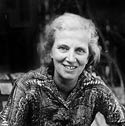 Dorothy Hodgkin 1910-1994 – Awarded
the Nobel prize for chemistry Dorothy Hodgkin work on critical
discoveries of the structure of both penicillin and later insulin. These
discoveries led to significant improvements in health care. An
outstanding chemist Dorothy also devoted a large section of her life to
the peace movement and promoting nuclear disarmament.
Dorothy Hodgkin 1910-1994 – Awarded
the Nobel prize for chemistry Dorothy Hodgkin work on critical
discoveries of the structure of both penicillin and later insulin. These
discoveries led to significant improvements in health care. An
outstanding chemist Dorothy also devoted a large section of her life to
the peace movement and promoting nuclear disarmament. Rosa Parks (1913-2005) – Rosa
Parks refusal to give up her bus seat to a white man indirectly led to
some of the most significant civil rights legislation of American
history. She sought to play down her role in the civil rights struggle
but for her peaceful and dignified campaigning she became one of the
most well respected figures in the civil rights movements.
Rosa Parks (1913-2005) – Rosa
Parks refusal to give up her bus seat to a white man indirectly led to
some of the most significant civil rights legislation of American
history. She sought to play down her role in the civil rights struggle
but for her peaceful and dignified campaigning she became one of the
most well respected figures in the civil rights movements.Queen Elizabeth II
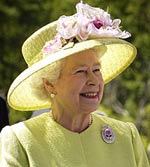 (1926
– ) Since ascending to the British throne in 1952, Elizabeth has served
as the second longest serving British monarch. She has witnessed rapid
social and economic change and has been a unifying influence for Britain
and the Commonwealth.
(1926
– ) Since ascending to the British throne in 1952, Elizabeth has served
as the second longest serving British monarch. She has witnessed rapid
social and economic change and has been a unifying influence for Britain
and the Commonwealth.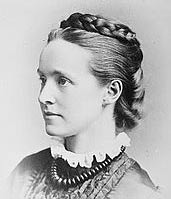 Millicent Fawcett (1846 – 1929) – Millicent
Garrett Fawcett was a leading suffragist and campaigner for equal
rights for women. She led Britain’s biggest suffrage organisation, the
non-violent (NUWSS) and played a key role in gaining women the vote. She
also helped found Newnham College, Cambridge.
Millicent Fawcett (1846 – 1929) – Millicent
Garrett Fawcett was a leading suffragist and campaigner for equal
rights for women. She led Britain’s biggest suffrage organisation, the
non-violent (NUWSS) and played a key role in gaining women the vote. She
also helped found Newnham College, Cambridge.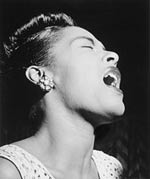 Billie Holiday (1915-1959)
– Given the title “First Lady of the Blues” Billie Holiday was widely
considered to be the greatest and most expressive jazz singer of all
time. Her voice was moving in its emotional intensity and poignancy.
Despite dying at the age of only 44 Billie Holiday helped define the
jazz era and her recordings are widely sold today.
Billie Holiday (1915-1959)
– Given the title “First Lady of the Blues” Billie Holiday was widely
considered to be the greatest and most expressive jazz singer of all
time. Her voice was moving in its emotional intensity and poignancy.
Despite dying at the age of only 44 Billie Holiday helped define the
jazz era and her recordings are widely sold today.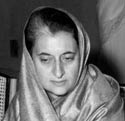 Indira Gandhi (1917-1984) – First
female prime minister of India. She was in power from between 1966-77
and 1980-84. Accused of authoritarian tendencies she only narrowly
avoided a military coup by agreeing to hold an election at the end of
the “emergency period” of 1977. She was assassinated in 1984 by her Sikh
bodyguards, in response to her storming of the Golden Temple.
Indira Gandhi (1917-1984) – First
female prime minister of India. She was in power from between 1966-77
and 1980-84. Accused of authoritarian tendencies she only narrowly
avoided a military coup by agreeing to hold an election at the end of
the “emergency period” of 1977. She was assassinated in 1984 by her Sikh
bodyguards, in response to her storming of the Golden Temple.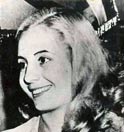 Eva Peron (1919-1952) – Eva
Peron was widely loved by the ordinary people of Argentina. She
campaigned tirelessly for both the poor and for the extension of women’s
rights. At the same time she was feared by some in power for her
popularity. She was also criticised for her intolerance of criticism;
with her husband Juan Peron they shut down many independent newspapers.
She died aged only 32 in 1952.
Eva Peron (1919-1952) – Eva
Peron was widely loved by the ordinary people of Argentina. She
campaigned tirelessly for both the poor and for the extension of women’s
rights. At the same time she was feared by some in power for her
popularity. She was also criticised for her intolerance of criticism;
with her husband Juan Peron they shut down many independent newspapers.
She died aged only 32 in 1952.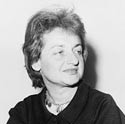 Betty Friedan (1921-2006)
– Leading feminist figure of the 1960s. Her book “The Feminine
Mystique” became a best seller and received both lavish praise and
intense criticism. Betty Friedan campaigned for an extension of female
rights and an end to sexual discrimination.
Betty Friedan (1921-2006)
– Leading feminist figure of the 1960s. Her book “The Feminine
Mystique” became a best seller and received both lavish praise and
intense criticism. Betty Friedan campaigned for an extension of female
rights and an end to sexual discrimination.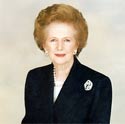 Margaret Thatcher (1925
– 2013) The first female Prime minister of Great Britain, Mrs Thatcher
defined a decade. In particular she is remembered for her emphasis on
individual responsibility and belief in free markets. Developed close
relationships with R. Reagan, but was more sceptical of European
integration.
Margaret Thatcher (1925
– 2013) The first female Prime minister of Great Britain, Mrs Thatcher
defined a decade. In particular she is remembered for her emphasis on
individual responsibility and belief in free markets. Developed close
relationships with R. Reagan, but was more sceptical of European
integration.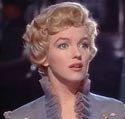 Marilyn Monroe (1926-1962)
Born Norma Jean Baker, Marilyn rose from childhood poverty to become
one of the most iconic film legends. Her films were moderately
successful, but her lasting fame came through her photogenic good looks
and aura of glamour and sophistication.
Marilyn Monroe (1926-1962)
Born Norma Jean Baker, Marilyn rose from childhood poverty to become
one of the most iconic film legends. Her films were moderately
successful, but her lasting fame came through her photogenic good looks
and aura of glamour and sophistication.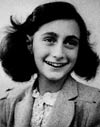 Anne Frank (1929-1945)
– Anne Frank’s diary is one of the most widely read books in the world.
It reveals the thoughts of a young, yet surprisingly mature 13-year-old
girl, confined to a secret hiding place. “Despite everything, I believe
that people are really good at heart.”
Anne Frank (1929-1945)
– Anne Frank’s diary is one of the most widely read books in the world.
It reveals the thoughts of a young, yet surprisingly mature 13-year-old
girl, confined to a secret hiding place. “Despite everything, I believe
that people are really good at heart.”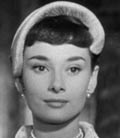 Audrey Hepburn (1929 – 1993) -Leading
female actor of the 1950s and 60s. Audrey Hepburn defined feminine
glamour and dignity, and was later voted as most beautiful women of the
twentieth century. After her acting career ended in the mid 1960s, she
devoted the remaining period of her life to humanitarian work with
UNICEF.
Audrey Hepburn (1929 – 1993) -Leading
female actor of the 1950s and 60s. Audrey Hepburn defined feminine
glamour and dignity, and was later voted as most beautiful women of the
twentieth century. After her acting career ended in the mid 1960s, she
devoted the remaining period of her life to humanitarian work with
UNICEF. Germaine Greer (1939
– ) Leading feminist icon of the 1960s and 1970s Germaine Greer enjoys
raising contentious issues. In particular her book “The Female Eunuch”
was a defining manifesto for the feminist movement, which proved
influential from the 1960s onwards.
Germaine Greer (1939
– ) Leading feminist icon of the 1960s and 1970s Germaine Greer enjoys
raising contentious issues. In particular her book “The Female Eunuch”
was a defining manifesto for the feminist movement, which proved
influential from the 1960s onwards.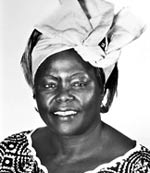 Wangari Maathai
(1940 – 2011 ) Kenyan born environmentalist, pro-democracy activist and
women’s rights campaigner. Awarded Nobel Peace Prize for efforts to
prevent conflict through protection of scarce resources.
Wangari Maathai
(1940 – 2011 ) Kenyan born environmentalist, pro-democracy activist and
women’s rights campaigner. Awarded Nobel Peace Prize for efforts to
prevent conflict through protection of scarce resources. Betty Williams (1943
– ) Together with Mairead Corrigan, Betty Williams campaigned
passionately to bring an end to the sectarian violence of Northern
Ireland. They founded the Community for Peace and were awarded the Nobel
Peace Prize in 1977 (post dated for 1976)
Betty Williams (1943
– ) Together with Mairead Corrigan, Betty Williams campaigned
passionately to bring an end to the sectarian violence of Northern
Ireland. They founded the Community for Peace and were awarded the Nobel
Peace Prize in 1977 (post dated for 1976)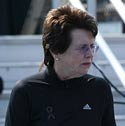 Billie Jean King (1943
– ) One of the greatest female athletes Billie Jean King was one of the
greatest female tennis champions who battled for equal pay for women.
She won 67 professional titles including 20 titles at Wimbledon.
Billie Jean King (1943
– ) One of the greatest female athletes Billie Jean King was one of the
greatest female tennis champions who battled for equal pay for women.
She won 67 professional titles including 20 titles at Wimbledon. Shirin Ebadi (1947-
) An Iranian lawyer, Ebadi has fought for human rights in Iran –
representing political dissidents and founding initiatives to promote
democracy and human rights. Awarded the Nobel Peace Prize in 2003.
Shirin Ebadi (1947-
) An Iranian lawyer, Ebadi has fought for human rights in Iran –
representing political dissidents and founding initiatives to promote
democracy and human rights. Awarded the Nobel Peace Prize in 2003.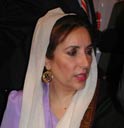 Benazir Bhutto (1953
– 2007) Benazir Bhutto was the first female prime minister of a Muslim
country. She helped to move Pakistan from a dictatorship to democracy
becoming Prime Minister in 1988. She sought to implement social reforms,
in particular helping women and the poor. She was assassinated in 2007.
Benazir Bhutto (1953
– 2007) Benazir Bhutto was the first female prime minister of a Muslim
country. She helped to move Pakistan from a dictatorship to democracy
becoming Prime Minister in 1988. She sought to implement social reforms,
in particular helping women and the poor. She was assassinated in 2007. Oprah Winfrey (1954
– ) Influential talk show host, Oprah Winfrey was the first women to
own her own talk show host. Her show and book club is tremendously
influential, usually focusing on issues facing American women.
Oprah Winfrey (1954
– ) Influential talk show host, Oprah Winfrey was the first women to
own her own talk show host. Her show and book club is tremendously
influential, usually focusing on issues facing American women.
Madonna (1958 – ) Madonna is the most successful female musician of all time. She has sold in excess of 250 million records. In addition to being a great pop musician she has rarely been out of the limelight.
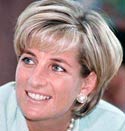 Diana, Princess of Wales (1961-1997) - Princess
Diana combined the appeal of a Royal princess with her humanitarian
charity work. Although her marriage to Prince Charles was overshadowed
by affairs on both sides, her popularity remained undimmed as many were
inspired by her natural sympathy with the poor and mistreated.
Diana, Princess of Wales (1961-1997) - Princess
Diana combined the appeal of a Royal princess with her humanitarian
charity work. Although her marriage to Prince Charles was overshadowed
by affairs on both sides, her popularity remained undimmed as many were
inspired by her natural sympathy with the poor and mistreated. J.K.Rowling (1965
– ) J.K.Rowling is the author of the phenomenal best selling Harry
Potter series. The volume of sales was so high, it has been credited
with leading a revival of reading by children. She wrote the first book
as a single mother, struggling to make ends meet, but is now one of most
successful self-made woman.
J.K.Rowling (1965
– ) J.K.Rowling is the author of the phenomenal best selling Harry
Potter series. The volume of sales was so high, it has been credited
with leading a revival of reading by children. She wrote the first book
as a single mother, struggling to make ends meet, but is now one of most
successful self-made woman.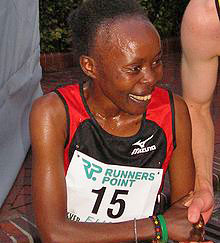 Tegla Laroupe
(1973 – ) Tegla Laroupe held the women’s marathon world record and won
many prestigious marathons. Since retiring from running, she has devoted
herself to various initiatives promoting peace, education and women’s
rights. In her native Kenya, her Peace Race and Peace Foundation have
been widely praised for helping to end tribal conflict.
Tegla Laroupe
(1973 – ) Tegla Laroupe held the women’s marathon world record and won
many prestigious marathons. Since retiring from running, she has devoted
herself to various initiatives promoting peace, education and women’s
rights. In her native Kenya, her Peace Race and Peace Foundation have
been widely praised for helping to end tribal conflict.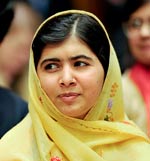 Malala Yousafzai (1997
– ) Pakistani schoolgirl who defied threats of the Taliban to campaign
for the right to education. She survived being shot in the head by the
Taliban and has become a global advocate for women’s rights, especially
the right to education.
Malala Yousafzai (1997
– ) Pakistani schoolgirl who defied threats of the Taliban to campaign
for the right to education. She survived being shot in the head by the
Taliban and has become a global advocate for women’s rights, especially
the right to education.
No comments:
Post a Comment